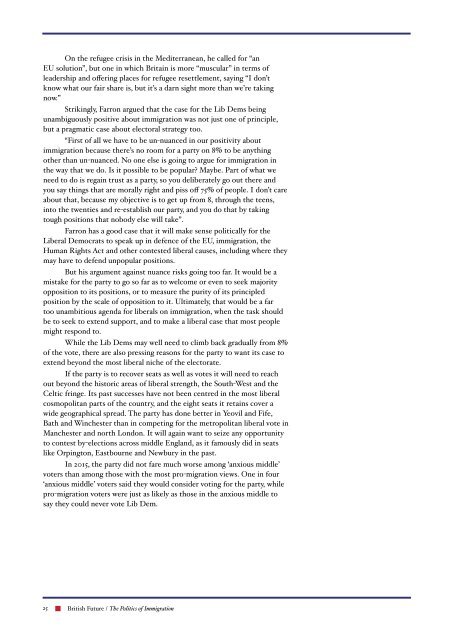THE POLITICS OF IMMIGRATION
The-politics-of-immigration
The-politics-of-immigration
You also want an ePaper? Increase the reach of your titles
YUMPU automatically turns print PDFs into web optimized ePapers that Google loves.
On the refugee crisis in the Mediterranean, he called for “an<br />
EU solution”, but one in which Britain is more “muscular” in terms of<br />
leadership and offering places for refugee resettlement, saying “I don’t<br />
know what our fair share is, but it’s a darn sight more than we’re taking<br />
now.”<br />
Strikingly, Farron argued that the case for the Lib Dems being<br />
unambiguously positive about immigration was not just one of principle,<br />
but a pragmatic case about electoral strategy too.<br />
“First of all we have to be un-nuanced in our positivity about<br />
immigration because there’s no room for a party on 8% to be anything<br />
other than un-nuanced. No one else is going to argue for immigration in<br />
the way that we do. Is it possible to be popular? Maybe. Part of what we<br />
need to do is regain trust as a party, so you deliberately go out there and<br />
you say things that are morally right and piss off 75% of people. I don’t care<br />
about that, because my objective is to get up from 8, through the teens,<br />
into the twenties and re-establish our party, and you do that by taking<br />
tough positions that nobody else will take”.<br />
Farron has a good case that it will make sense politically for the<br />
Liberal Democrats to speak up in defence of the EU, immigration, the<br />
Human Rights Act and other contested liberal causes, including where they<br />
may have to defend unpopular positions.<br />
But his argument against nuance risks going too far. It would be a<br />
mistake for the party to go so far as to welcome or even to seek majority<br />
opposition to its positions, or to measure the purity of its principled<br />
position by the scale of opposition to it. Ultimately, that would be a far<br />
too unambitious agenda for liberals on immigration, when the task should<br />
be to seek to extend support, and to make a liberal case that most people<br />
might respond to.<br />
While the Lib Dems may well need to climb back gradually from 8%<br />
of the vote, there are also pressing reasons for the party to want its case to<br />
extend beyond the most liberal niche of the electorate.<br />
If the party is to recover seats as well as votes it will need to reach<br />
out beyond the historic areas of liberal strength, the South-West and the<br />
Celtic fringe. Its past successes have not been centred in the most liberal<br />
cosmopolitan parts of the country, and the eight seats it retains cover a<br />
wide geographical spread. The party has done better in Yeovil and Fife,<br />
Bath and Winchester than in competing for the metropolitan liberal vote in<br />
Manchester and north London. It will again want to seize any opportunity<br />
to contest by-elections across middle England, as it famously did in seats<br />
like Orpington, Eastbourne and Newbury in the past.<br />
In 2015, the party did not fare much worse among ‘anxious middle’<br />
voters than among those with the most pro-migration views. One in four<br />
‘anxious middle’ voters said they would consider voting for the party, while<br />
pro-migration voters were just as likely as those in the anxious middle to<br />
say they could never vote Lib Dem.<br />
25 British Future / The Politics of Immigration


